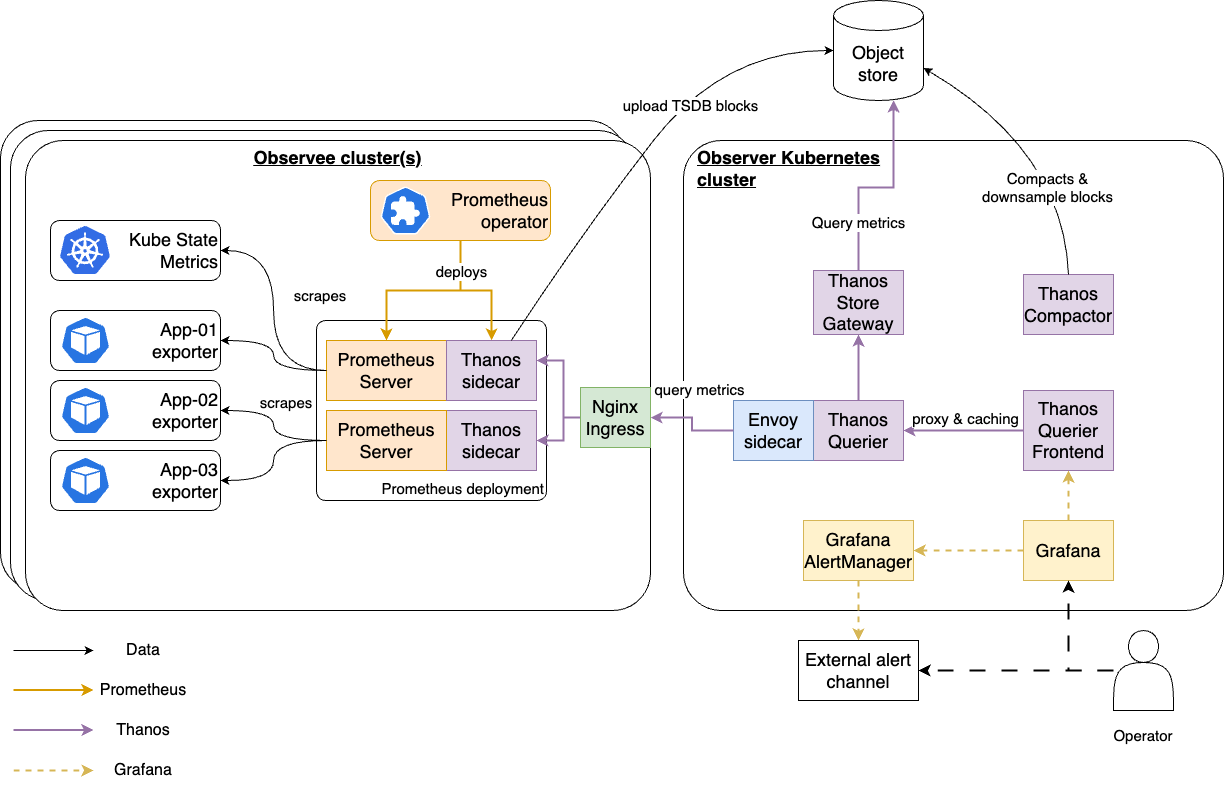Metrics Tools: Thanos
Thanos is used within the Observability Stack for the long-term storage and centralization of Prometheus metrics data. It relies on the Thanos Bitnami Helm Chart.
Architecture

Quickstart
The Observability Stack recommends creating a Kubernetes secret named "thanos-objectstorage" for Thanos S3 connection details. This secret should then be mounted using the existingObjstoreSecret field in the Helm chart values, rather than passing the values directly to the Helm chart or as an argument.
The S3 connection YAML manifest should follow this format:
type: S3
config:
bucket: <thanos-object-storage-bucket-name>
endpoint: <s3-endpoint>
region: <region>
aws_sdk_auth: false
access_key: <access_key>
insecure: false
signature_version2: false # Equivalent to v4auth: true
secret_key: <secret_key>
bucket_lookup_type: path # Equivalent to pathstyle: true
More details can be found in the Thanos documentation.
To create this secret via kubectl, use the following command, ensuring your YAML manifest is saved to a file (e.g., thanos-s3-creds.yaml):
kubectl create secret generic thanos-objectstorage --from-file=thanos-s3-creds.yaml
Advanced Configuration
Envoy Sidecar for Thanos
Utilizing an Envoy sidecar presents a viable alternative for enabling cross-cluster communications between observer and observee clusters, especially in situations where setting up a VPN or cluster mesh is too complex or expensive to set up or maintain. In such a scenario, the observer cluster, which hosts Thanos, would require connections to multiple remote Thanos Sidecar instances located within observee clusters. (e.g., to their ingress endpoints, of which the configs below are based).
To achieve this, the query sidecar component within the Thanos Helm Chart values.yaml manifest needs to be configured. An example configuration snippet can be seen below;
query:
enabled: true
replicaLabel:
- "prometheus_replica"
- "rule_replica"
dnsDiscovery:
sidecarsService: "prometheus-operated"
sidecarsNamespace: "cattle-monitoring-system" # the namespace of the prometheus deployment. (this is cattle-monitoring-system for rancher-monitoring operator)
sidecars:
- name: observer-envoy-sidecar
args:
- "-c"
- /config/envoy.yaml
image: "envoyproxy/envoy:v1.16.0"
ports:
- name: envoy-observee01
containerPort: 10000
protocol: TCP
volumeMounts:
- name: envoy-config
mountPath: "/config"
mountPropagation: None
extraVolumes:
- name: envoy-config
configMap:
name: thanos-envoy-config
defaultMode: 420
optional: false
stores:
- "dnssrv+_envoy-observee01._tcp.thanos-envoy-sidecar.thanos-system.svc.observer.local"
- "dnssrv+_[port_name]._tcp.[service-name].[namespace].svc.[clusterDomain].local"
For an automated Envoy v3 configuration into the Envoy sidecars, the ConfigMap should be integrated into the base directory alongside with corresponding kustomization.yaml file ensures automatic creation of the ConfigMap.
An example Envoy v3 ConfigMap envoy-v3.yaml and kustomization.yaml can be seen below and under base directory;
apiVersion: v1
kind: Service
metadata:
name: thanos-envoy-sidecar
labels:
name: thanos-envoy-sidecar
spec:
type: ClusterIP
selector:
app.kubernetes.io/component: query
app.kubernetes.io/managed-by: Helm
app.kubernetes.io/name: thanos
ports:
- name: envoy-observee01
protocol: TCP
port: 10000
targetPort: 10000
sessionAffinity: "None"
---
apiVersion: v1
kind: ConfigMap
metadata:
name: thanos-envoy-config
data:
envoy.yaml: |
admin:
access_log_path: /tmp/admin_access.log
address:
socket_address: { address: 0.0.0.0, port_value: 9901 }
static_resources:
listeners:
- name: envoy-observee01
address:
socket_address:
address: 0.0.0.0
port_value: 10000
filter_chains:
- filters:
- name: envoy.http_connection_manager
typed_config:
"@type": type.googleapis.com/envoy.extensions.filters.network.http_connection_manager.v3.HttpConnectionManager
codec_type: AUTO
access_log:
- name: envoy.access_loggers.file
typed_config:
"@type": type.googleapis.com/envoy.extensions.access_loggers.file.v3.FileAccessLog
path: /dev/stdout
log_format:
text_format: |
[%START_TIME%] "%REQ(:METHOD)% %REQ(X-ENVOY-ORIGINAL-PATH?:PATH)% %PROTOCOL%"
%RESPONSE_CODE% %RESPONSE_FLAGS% %RESPONSE_CODE_DETAILS% %BYTES_RECEIVED% %BYTES_SENT% %DURATION%
%RESP(X-ENVOY-UPSTREAM-SERVICE-TIME)% "%REQ(X-FORWARDED-FOR)%" "%REQ(USER-AGENT)%"
"%REQ(X-REQUEST-ID)%" "%REQ(:AUTHORITY)%" "%UPSTREAM_HOST%" "%UPSTREAM_TRANSPORT_FAILURE_REASON%"\n
- name: envoy.access_loggers.file
typed_config:
"@type": type.googleapis.com/envoy.extensions.access_loggers.file.v3.FileAccessLog
path: /dev/stdout
stat_prefix: ingress_http
route_config:
name: local_route
virtual_hosts:
- name: local_service
domains: ["*"]
routes:
- match:
prefix: "/"
route:
cluster: envoy-observee01
host_rewrite_literal: prometheus-envoy-observee01.observability.[yourdomain].com
http_filters:
- name: envoy.filters.http.router
clusters:
- name: envoy-observee01
connect_timeout: 30s
type: LOGICAL_DNS
http2_protocol_options: {}
dns_lookup_family: V4_ONLY
lb_policy: ROUND_ROBIN
load_assignment:
cluster_name: envoy-observee01
endpoints:
- lb_endpoints:
- endpoint:
address:
socket_address:
address: prometheus-envoy-observee01.observability.[yourdomain].com
port_value: 443
transport_socket:
name: envoy.transport_sockets.tls
typed_config:
"@type": type.googleapis.com/envoy.extensions.transport_sockets.tls.v3.UpstreamTlsContext
common_tls_context:
alpn_protocols:
- h2
- http/1.1
sni: prometheus-envoy-observee01.observability.[yourdomain].com
For detailed information, you can refer to the Thanos Documentation for Cross-cluster communication.
External Secrets
For an automated setup, the S3 connection secret thanos-s3-creds.yaml should be integrated into the base directory alongside the Thanos and Prometheus metrics components. A corresponding kustomization.yaml file ensures the automatic creation of the secret. This setup supports both regular Kubernetes secrets (without encryption) and more secure approaches like integrating with HashiCorp Vault, utilizing the external-secrets-operator to import the secret as an ExternalSecret object.